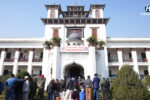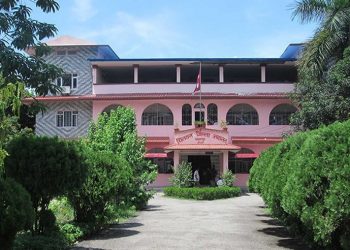KATHMANDU: Economic Digest, a daily morning email digest, is basically a relatable summation of important business news from Nepal into easy-to-understand summaries.
NRB to crackdown on ‘illegal’ payments for social media ads
Nepal Rastra Bank, the country’s central bank, said it will start taking action against those making or receiving international payments for advertisements on the internet and in social media like Facebook, Twitter, and YouTube as well as online portals.
Similarly, the central bank has also made it clear that action will be taken against those who carry out such transactions. These will be taken under foreign currency-related offenses.
Sugar mills ignore floor price set by govt
Sugarcane farmers are compelled to sell sugarcane at the price set by the sugar mills instead of the floor price set by the government at Rs 536.56 per quintal, which includes the government subsidy of Rs 65.28 per quintal.
Bhageshwor Sugar and Chemical Industries Private Limited of Purnavas and Mahakali Sugar Mill of Belauri have formed a committee to determine the price of sugarcane. Farmers in Kanchanpur have no choice but to sell sugarcane at the price determined by the sugar mills.
According to farmers, middlemen are making profits by purchasing chits from farmers at lower prices. “I did not receive the chit on time from the sugar mill, instead the middleman gave me the chit and I sold my sugarcane to him,” said a farmer who did not want to disclose his name.
Investors await construction of electrical sub-station at Bhairahawa SEZ
Engineer at the Special Economic Zone (SEZ), Laxman Bhattarai is worried about the lack of electricity specialist at SEZ and taking care of all technical issues have delayed the tender process.
“It is hard to work according to the plan in the absence of an electricity specialist,” said Bhattarai. In 2016, during the second inauguration of the SEZ, former executive director Chandrika Prasad Bhatta had committed to complete the tender procedure within six months and construct the 33KV sub-station in a year and a half.
However, three years have already passed since the SEZ Bhairahawa has been involved in trying to complete the tender procedure for the electric sub-station.
Organic farmers discouraged due to the high cost of accreditation
Organic farmers and entrepreneurs in Nepal are facing a lot of obstacles to sell their products overseas as foreign accreditation of their products is expensive.
“If the government helps in the accreditation process and lets the farmers focus on mass production instead of producing limited agricultural products, then the products can be sold for a cheaper price,” Shanta Baskota Koirala, the general secretary of Organic Association Nepal, said, “One of the reasons for the high price of organic products is because of the accreditation expenses and lack of lab tests in Nepal.”
Govt looks for an alternative to fulfill gap from Chinese tourists
The target set by the government in bringing 500,000 Chinese tourists to Nepal is affected by the coronavirus outbreak in China and the country’s restriction on group travel for its citizens.
Minister for Culture, Tourism and Civil Aviation Yogesh Bhattarai, in an interaction program with tourism stakeholders, said, “We should look into possibilities of fulfilling the gap produced due to the drop in the Chinese tourists’ arrival to Nepal.”
China has the second-largest share of tourists coming to Nepal, while India stands in the first position. “As a major source of tourists, we had plans of bringing in 500,000 Chinese tourists to Nepal this year but with the epidemic spreading across the country, it will be difficult to fill in the quota,” he said, “For the time being, we should rather focus on where should the supply fulfillment can be done from?”
Campaign launched in Nepal to send 500,000 face masks to China
Nepal has decided to help China with the fight against the coronavirus, by launching a campaign to send 500,000 face masks to various parts of China. The initiative has been taken by a Kathmandu-based private organization, Society of Sino-Nepalese Himalayan Studies (SSNHS), which works to promote Sino-Nepal ties.
Ncell submits plan to clear dues in five months
Nepal’s privately-owned telecom company, Ncell is learned to have submitted a plan to the Large Taxpayers’ Office in a bid to clear all its dues within the next five months. The company had in December last year made a partial payment of Rs 4.5 billion the Large Taxpayers’ Office. Ncell now has expressed the commitment to clear the dues related to outstanding capital gain tax by May.
It has outstanding dues of around Rs 22.44 billion, reports said. The Large Taxpayers’ Office last year had issued a notice in the name of Ncell instructing to clear all dues after the Supreme Court (SC) in November 2019 said it had to pay over 21 billion.
Nepali pashmina industry fails to grow despite aid, incentives
The pashmina industry in Nepal has not been able to advance its business although it was listed in the high priority export list of the government. This is due to the lack of publicity and failure to produce the raw material nationally.
The statistics of the Trade and Export Promotion Centre shows that the export income of pashmina products reduced by 16.1% to Rs 1.90 billion in the fiscal year 2018/19. In the first five months of the present fiscal year, the export earnings lowered by 11.7% to Rs 1.06 billion.
The product has been given the label of high export potential items by the Nepal government. The product receives a cash incentive of 2-5% of the export value. Nepali pashmina industry also receives support from international organizations such as the World Bank and the International Trade Centre (ITC).
The World Bank is investing $115 million in livestock production. While, the international lending institution has been investing in the project to create Nepal self-reliant in the production of meat, milk and pashmina wool.
Cooperatives’ investment in production sector at a mere 0.85 percent
The cooperatives sector is considered one of the three major pillars of the country’s economy but its investment in the productive sector is a mere 0.85 percent.
The 35,000 cooperative institutions in the country have savings totaling around Rs 700 billion. The size of the budget unveiled by the government for the fiscal year 2019/20 is Rs 1 trillion 532 billion 967 million 100 thousand.
In relation to the size of the budget, the savings with the cooperatives Rs 700 billion comes to be about 46 percent of the budget. Based on a data, only 0.85 percent of the total cooperatives are involved in the productive sector, which means the cooperatives’ contribution to the national economy said to be a socialism-oriented economy is nominal.
Sixty-three thousand persons are directly employed in cooperatives. This number is 0.24 percent of the total population of the country as per the census of 2011. Nepal’s population as per this census is 26 million 494 thousand 504.
Contractors face Rs 90 million fine for missing deadline
The Rural Road Network Improvement Project has terminated the agreement with JJECCAL-Pappu-Koshi and Neupane joint venture as the latter failed to meet the deadline. The JJECCAL-Pappu-Koshi and Neupane joint venture were awarded a contract to blacktop 20-kilometers-road for Rs. 440 million but were not able to complete the project in time.
The deadline of the project was was April 20, 2019, but the company has not even completed 15% of the work and the agreement was cancelled on January 25, 2020.
India reduces grant to Nepal in new budget
India has made a noticeable reduction in its grant to Nepal in its budget for the current fiscal year. India’s new budget, presented in the Parliament on Saturday, makes the revelation that India has gone for reducing its grant to Nepal making it merely 8 billion Indian rupees for the current fiscal year.
Indian Finance Minister Nirmala Sitaraman has made the reduction of 4 billion rupees this year as in FY 2019/20 the budget for Nepal was 12 billion rupees. This is a 33% reduction in last year’s budget.
The midterm budget of FY 2019/20 had consented to provide 12 billion which was actually a considerable increment in the previously proposed 10.5 billion in the budget proposed at the beginning of the year.
Meanwhile, India has increased a grant for Bhutan by 8%. In fact, 28.846 billion rupees is allocated for Bhutan this year.
Chinese dry garlic prices more than double on loss of supplies
The coronavirus outbreak in China has sent dry Chinese garlic prices to double in recent weeks in the Nepali retail market.
According to traders, the dramatic rise in prices was triggered by a halt in supply from China, but consumer rights activists are blaming traders for using the epidemic as an excuse to increase the prices.
(Compiled and prepared by Swastik Aryal, Akash Shrestha, Nitish Lal Shrestha, Diana Zulkifli)
Nepal Economic Digest is a daily morning email digest, basically relatable summations of the most important business news, happenings from Nepal into easy-to-understand summaries. The Institute for Strategic and Socio-Economic Research (ISSR), Nepal’s independent think tank, and Khabarhub — Nepal popular news portal — have joined hands to disseminate news from Nepal in the form of Economic Digest.









Comment